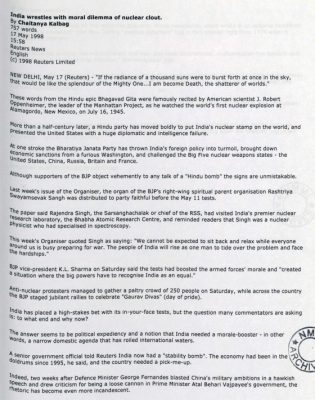India wrestles with moral dilemma of nuclear clout
[Reuters]
Published date: 17th May 1998
17 May 1998
Reuters News
English
(c) 1998 Reuters Limited
NEW DELHI, May 17 (Reuters) – “If the radiance of a thousand suns were to burst forth at once in the sky, that would be like the splendour of the Mighty One … I am become Death, the shatterer of worlds.”
These words from the Hindu epic Bhagavad Gita were famously recited by American scientist J. Robert Oppenheimer, the leader of the Manhattan Project, as he watched the world’s first nuclear explosion at Alamagordo, New Mexico, on July 16, 1945.
More than a half-century later, a Hindu party has moved boldly to put India’s nuclear stamp on the world, and presented the United States with a huge diplomatic and intelligence failure.
At one stroke the Bharatiya Janata Party has thrown India’s foreign policy into turmoil, brought down.
Economic sanctions from a furious Washington, and challenged the Big Five nuclear weapons states – the United States, China, Russia, Britain and France.
Although supporters of the BJP object vehemently to any talk of a “Hindu bomb” the signs are unmistakable.
Last week’s issue of the Organiser, the organ of the BJP’s right-wing spiritual parent organisation Rashtriya Swayamsevak Sangh was distributed to party faithful before the May 11 tests.
The paper said Rajendra Singh, the Sarsanghachalak or chief of the RSS, had visited India’s premier nuclear research laboratory, the Bhabha Atomic Research Centre, and reminded readers that Singh was a nuclear physicist who had specialised in spectroscopy.
This week’s Organiser quoted Singh as saying: “We cannot be expected to sit back and relax while everyone around us is busy preparing for war. The people of India will rise as one man to tide over the problem and face the hardships.”
BJP vice-president K.L. Sharma on Saturday sald the tests had boosted the armed forces’ morale and “created a situation where the big powers have to recognise India as an equal.”
Anti-nuclear protesters managed to gather a paltry crowd of 250 people on Saturday, while across the country the BJP staged jubilant rallies to celebrate “Gaurav Divas” (day of pride).
India has placed a high-stakes bet with its In-your-face tests, but the question many commentators are asking IS: to what end and why now?
The answer seems to be political expediency and a notion that India needed a morale-booster – in other words, a narrow domestic agenda that has roiled international waters.
A senior government official told Reuters India now had a “stability bomb”. The economy had been in the doldrums since 1995, he said, and the country needed a pick-me-up.
Indeed, two weeks after Defence Minister George Fernandes blasted China’s military ambitions in a hawkish speech and drew criticism for being a loose cannon in Prime Minister Atal Behari Vajpayee’s government, the Thetoric has become even more incandescent.
Two days after China’s foreign ministry lashed out at India for trying “to obtain hegemony in South Asia in defiance of world opinion”, New Delhi hit back with equally harsh words.
“India has legitimate security concerns,” an official spokesman said on Saturday, adding: “Assistance from external sources (read China) to the clandestine nuclear programme in our immediate neighbourhood (read Pakistan) is well known.”
New Delhi charged that between 1964 and 1996 China had conducted 45 nuclear tests and said “it should be Possible to understand the rationale for India conducting a limited number of tests after a 24-year-long period of voluntary restraint”.
But that rationale was lost on the respected Economic Times newspaper, which wrote in an editorial headlined “Strategically irrelevant” that New Delhi’s “credible deterrent” had in fact existed right from 1974 when It conducted its first test.
“India’s strategic position has not improved, and may just have deteriorated … nuclearisation has actually cost India the edge it once had over Pakistan,” the newspaper said.
Vinod Mehta, editor of Outlook newsmagazine, noted that a promised strategic review of India’s defence needs had never taken place. Vajpayee had arrested the drift in a “50-day coalition on the verge of collapse” and silenced opposition parties.
India’s brief border war with China had taken place 36 years ago, and relations with Pakistan had been slowly improving.
“The five blasts reintroduce the poison in our relationship,” he wrote. “Next time there is a border skirmish (with Pakistan), petrified citizens in both countries will be trembling wondering when the dreaded button will be pressed – and in which country.”






